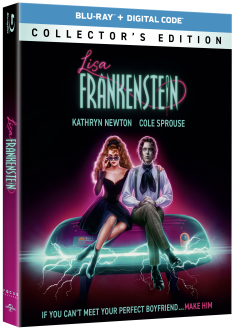Mountains May Depart
Overview -
Mainland master Jia Zhangke (A Touch of Sin) scales new heights with Mountains May Depart. Starring the luminous Zhao Tao, the film is both an intimate drama and a decades-spanning epic about how China's capitalist experiment has affected the lives of one splintered family, leaping in time from the past to the present to the speculative near-future. Jia's new film is an intensely moving study of how China's economic boom and the culture of materialism it has spawned has affected the bonds of family, tradition, and love.
Storyline: Our Reviewer's Take
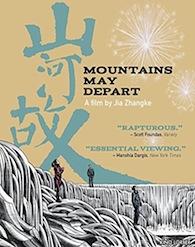
I must disclose here and now that I’m reviewing this film from a philistine point of view when it comes to recent foreign language releases. The last Chinese-made movie I saw in theaters was ‘Crouching Tiger, Hidden Dragon’ which, despite its popularity, isn’t exactly high art when it comes to the best of cinema. Therefore, my obviously crass and crude domestic standards may very well reveal an appalling lack of understanding and insight into ‘Mountains May Depart’ a critically acclaimed film which yearns to be profound, but to me, comes off as muddled.
The movie tells the story of a Chinese woman living through a twenty-six year period of social, cultural, and personal change in her home country. These years cover three separate time periods: 1999, 2014, and 2025, with each date occupying approximately one third of the two-hour running time. The opening shot of the the main character, Shen Tao played by Tao Zhao, shows her line-dancing joyfully to an eighties pop tune (a cover by the Pet Shop Boys). She is carefree and enjoying time with her friends, including a suitor who later pursues her with a vengeance. Eventually, Shen Tao is caught in a love triangle between the rather well-to-do Zhang Jinsheng (played by Yi Zhang) and the working-class Liangzi (Jing Dong Liang). We follow their relationship leading to her marriage to one, the departure of the other, and the eventual birth of her son, Zhang Daole. We then jump 15 years in the future, where Tao has long been divorced and living a rather lonely existence without custody of her child Daole, who is later nicknamed “Dollar” in his post-teen years. We then skip 11 more years to 2025 (where true Hoverboards apparently still haven’t been invented yet, but the next generation of iPads are everywhere), and the young adult Dollar becomes the main focus. He lives comfortably in Australia with his father, but yearns for independence and to reunite with his mother.
Among the four main players are other supporting characters, including Dollar’s teacher who helps him learn about his heritage while striking up a sexual relationship with her young Padawan. The divorced Shen Tao’s life is further complicated following the death of her kindly father, as she finds herself growing older and without any close family. However, the fate of the Jinsheng and Liangzi is pretty much left without any final resolution, even though one contracts a life-threatening illness and the other finds himself with suicidal and homicidal thoughts with every personal hardship involving his wife and son.
Overall, I found ‘Mountains May Depart’ to be interesting at best, ponderous at worst. The theme of the film is about progress, and how the change in class structure and consumerism affects culture, values and the population in China. Some changes are superficial and relatively minor, such as Volkswagens being replaced by Audis, and CD and cassette machines rendered obsolete by PC devices. More significant changes include once humble homes being updated with 21st century technology, the younger generation losing their native language, and Chinese names being westernized for easier understanding (Jinsheng now goes by “Peter” and Daole evolves into “Dollar”). It’s a quiet look at the generational changes in a country with such rigid traditions and politics, and the film succeeds in its exploration.
My primary beef has to do with the style of 'Mountains May Depart,' in which characters quietly deliver small bits of dialogue in between long pauses of pouting and staring off into space. There is also the matter of how the movie is presented to suit the time periods: the 1999 scenes are presented in a 4:3 aspect ratio, the 2014 scenes are displayed as 16:9 widescreen, and the 2024 scenes are shown in 2.35:1 with letterboxing. There are several distracting moments where one character is obviously interacting with someone, but we don’t get to see who it is until the camera finally pans to either side. Sometimes, this approach works: in an emotional scene, Shen Tao is crying over her father’s death and reacting to an offscreen voice, and his significance to the story isn’t revealed until the camera turns to him. But earlier in the movie (unsurprisingly, the 4:3 shots), the three main characters have a personal confrontation outside a disco, with one guy punching another, but the viewer becomes confused as to who is left remaining in the room. The lack of establishing shots and reaction oftentimes distracted me from paying full attention to the actual drama. At first I believed that this awkward composition was a result of matting a widescreen picture into the 4:3 aspect ratio. However a comparison of the theatrical trailer (included as a bonus feature) shows that the movie was originally shot “square” and then masked off horizontally for widescreen. Whether this static approach was meant to heighten intimacy or drama within the story, or simply to comment on pan-and-scan video transfers of widescreen movies, I really had no idea until I looked at the supplements. As it turns out, the enclosed Blu-ray insert containing an essay by film historian and commentator Aliza Ma explains how the changing ratios serve an artistic intent by the director which was obviously beyond my insight.
None of the characters are particularly well-drawn out, and the male leads suffer the most since they are little more than representations of the bourgeoisie versus the proletariats. Even at the beginning of the movie, the rich boy is presented as showy, arrogant and one-dimensional, while the worker is of course more honest, modest and down-to-earth. Predictably, the noble coal miner comes down with a respiratory disease and cannot cover the medical costs, leading his wife to turn to She Tao for help. However, this plot-point felt much too contrived, and the stereotyped personalities lessened my sympathy with any of the characters and diminished my overall interest in their plight.
The acting is just okay. Even though she has her moments, Tao Zhao (who is apparently married to the director) comes off as flat and monotonous during the first part of the movie. Scenes which take place in 2014 show her ability to cry convincingly and on cue, but overall I found it hard to believe that either suitor would have that much of an attraction to her, especially to the point where one of them seems intent on murdering the other (with dynamite, no less). Jinsheng is portrayed mainly as temperamental and bitter, while Liangzhi is usually quiet and subdued. Zijian Dong plays Dollar as an upbeat adult, but he, too, falls into a pattern of reserve and stoicism as he searches for what he calls “freedom.” I assume that we are supposed to find deeper meaning in his character's actions, but by the time his story was told (inconclusively, I may add), my interest in 'Mountains May Depart' was nearly deflated. As a result, I felt only a modicum of emotional resonance during the final shot of his elderly mother, dancing once again just as she did at the beginning of the movie.
The Blu-ray: Vital Disc Stats
‘Mountains May Depart’ is presented by Kino Lorber on a BD50 disc in a standard Blu-ray case. The cover features elegant branded by press quotes which praise the movie. Also enclosed is a 12-page booklet containing an essay by Aliza Ma of ‘Film Comment’ and several photos from the movie. The disc plays without any front-loaded trailers, and presents a static menu duplicating the boxcover art with highlighted options.
Video Review
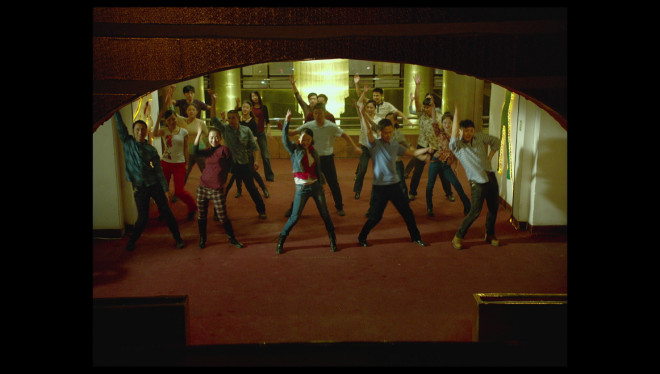
The Blu-ray picture is presented in AVC-encoded 1080p resolution, with the movie presented in varying aspect ratios to represent different time periods. Colors are strong throughout, but brightness varies as the movie progresses in accordance with the director’s intent. The transfer isn’t without minor flaws. In a scene, Tao visits her sick friend and her black hair seems to be affected by false contouring which lasts briefly, but was noticeable on my 55” screen. A few of the disco scenes feature strobe lights causing occasional pixelation and blurring. None of these limited problems affect casual viewing, nor will they detract from the cinematography which show splendid images of China and Australia.
Audio Review
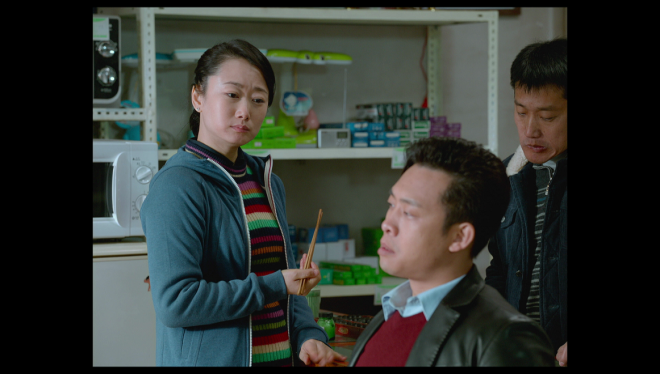
Audio is appropriately subdued for this type of drama, even though the mix is presented in 5.1 surround as well as two-channel stereo. The surround sound mix comes to life in two notable sequences: in which a helicopter lands and takes off in a Melbourne airport, and on a beach where the waves crash all around. Also, the stereo separation is excellent with the music soundtrack, which is particularly important when pop songs take centerstage. The center channel produces clear and intelligible dialogue, even with distinctively foreign accents. This is not to say that the soundtrack is demonstration quality, but I was impressed enough to take notice of an otherwise monophonic film.
While the Blu-ray offers English subtitles when Chinese is spoken, I could not access English subtitles for the entire movie, especially during scenes where Australian accents are nearly as impenetrable.
Special Features

The bonus features are limited to three offerings:
New York Film Festival: A Conversation with Jia Zhangke (HD, 2.0 stereo)- Viewers are given a question and answer session with the director, which at a running time of 73 minutes goes on longer than what would otherwise be necessary due to the need of an interpreter. For instance, It takes a good several minutes just to find out the answer to a quick question about the English and Chinese pop songs used on the soundtrack. I realize that this sort of presentation cannot be helped, but my lackluster reaction to the movie did not make feel too charitable to a supplement which runs over an hour. Except for the occasional close-up, this featurette is shot in a static flat angle with no excerpts of the film being shown. While I appreciate the time allotted to this “behind the scenes” discussion, I found it difficult to sit through in a single sitting.
Trailer (HD, 2.0 stereo) – This trailer runs for one minute and fifty eight minutes and provides a good summation of the storyline. While nicely produced with portentous dialogue and alluring images, the preview is slightly misleading as it focuses greatly on the younger and English-speaking Dollar, whose character as an adult does not appear until the last third of the film. While the son of Shen Tao is an integral part of her existence, his appearance is actually a minor part of his mother’s story. More than likely, this trailer was compiled to give 'Mountains May Depart' more mass appeal and attract a younger audience.
A booklet is inserted in the Blu-ray case, entitled “Coming Home: An Essay by Aliza Ma” and provides an appreciative look at the main feature.
Final Thoughts
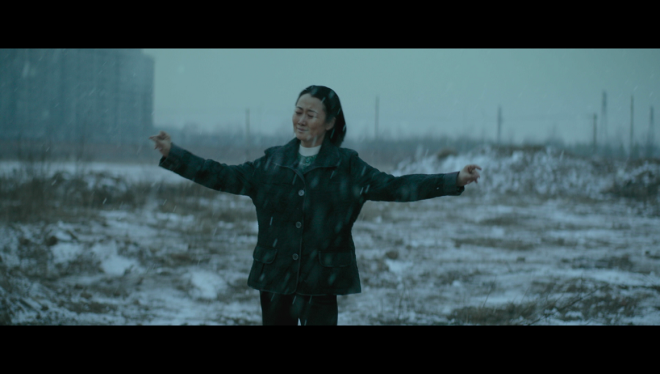
Good movies are a rarity in this age of Hollywood releases, and great movies seem to be a truly endangered species from any part of the world. I was hoping that as a Chinese production, 'Mountains May Depart' would result in something truly inspiring in both character and story, and further confirm that when it comes to art, foreign and independent films are our only hope. Unfortunately, I was too distracted by the directorial style, and characters who didn't support the filmmaker's ambition. 'Mountains May Depart' is indeed a nice, quiet and intelligent alternative to yet another city demolishing alien invasion/superhero/natural disaster Hollywood epic, but the overall product isn't enough for me to recommend.




